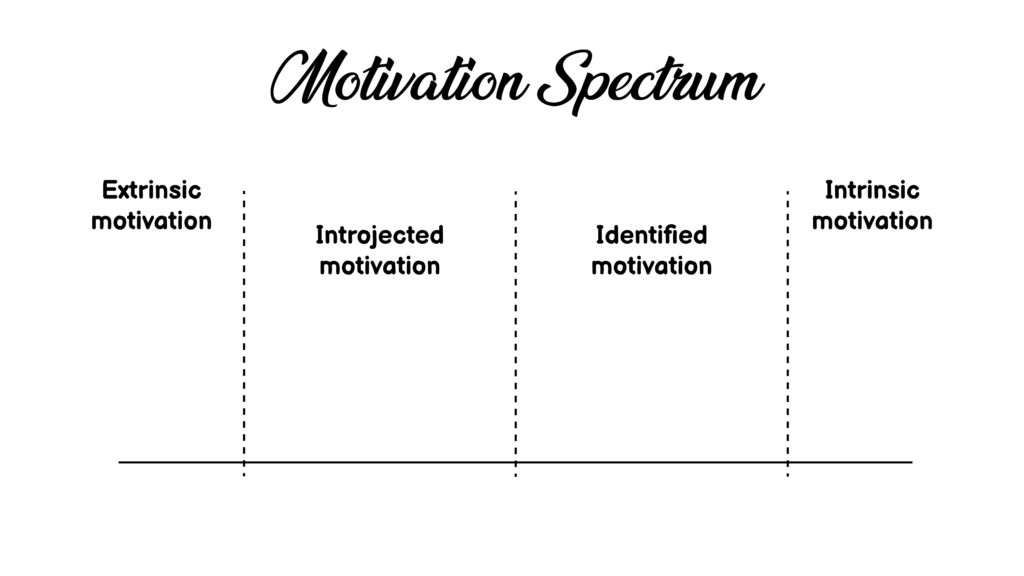7 reasons why you Struggle with Motivation
Motivation plays a vital role in our lives, driving us to pursue our goals and take action. However, many of us struggle with maintaining motivation over time. You ask yourself tons of questions like: “Why do I not feel motivated? Why did I lose all my motivation? How to find motivation to do things? How can I motivate myself to do something?”
Rest assured, I did feel that way too, and that’s exactly the reason why I decided to talk about this topic! I want to share my experience and ways I found to overcome this lack of motivation.
Before we dive in, let’s first understand what motivation is. Motivation is a driving force through which people strive to achieve their goals and fulfil a need or uphold a value.
The Motivation Spectrum
The ‘Motivation Spectrum’ explains further more what motivates individuals.

On one end of the spectrum, we have pure Extrinsic motivation: that is when you’re doing something to gain a reward or to avoid some kind of punishment. For example, paying a parking fine is not something we enjoy intrinsically, but we do it to avoid legal consequences.
Pure extrinsic motivation lacks the inherent enjoyment of the activity itself and solely focuses on external incentives.
On the other end of the spectrum we have pure ‘Intrinsic motivation’, and that is when you’re motivated to do something, purely for the joy of doing the thing : you’re doing it because it’s “fun” ! Just like when you play video games, or hang out with friends or when you’re watching Netflix. You’re not doing the thing to get ahead in life, you’re doing it simply because it’s enjoyable.
But there’s actually two more types of motivation that you may have not come across before : Identified motivation and Introjected motivation.
Introjected Motivation
Let’s first understand Introjected motivation..
Introjected motivation is when the reason you’re doing something is because you would feel a sense of shame or guilt if you didn’t do the thing.
For example, introjected motivation is when you study for an exam because if you don’t study, you feel guilty because you know your parents have sacrificed a lot for your education. You may not enjoy the exam, or even your degree. But you’re doing it because you would feel really guilty if you didn’t do it.
Maybe no one would blame you if you failed, but it is a form of motivation where you’re kind of beating yourself up for not doing the thing.
Identified Motivation
And then we have the identified motivation, and that is the key to doing things you actually don’t enjoy doing but have to do. Now even intrinsic motivation often doesn’t stay that way.
Some people that go to the gym have this thing where gym is fun, but there are some days where you just don’t feel like going and that’s where your intrinsic motivation has run out.
Some people would suggest you rely on willpower and discipline, or maybe to try and find a way to actually convince yourself that the only way of reaching the goal you’re striving for is by doing it even on the days you don’t feel like it.
By understanding the commitment you made to yourself, this intrinsic motivation you may lack, could turn into an identified motivation, and that’s when you will keep doing something you don’t necessarily enjoy at that specific moment, because you actually care about the results you are striving for.
Having understood these 4 types of motivation, how do we stay motivated for things?
How can I stay motivated?
First, I’d like to tell you that it is completely normal to feel like you’ve run out of motivation, we all did at some point. But there are ways you can overcome that lack of motivation.
- The key is Identified motivation: Within that, we need to set what we call ‘self-concordance’, and that is to connect our goals with personal values. When we’re setting a goal, we want to understand why we actually want to do this thing. The more we are able to connect that to the ‘sense of self’, the more likely we are to have identified motivation. Remember, you’re choosing to do that thing because you want the outcome and no one is forcing you.
- The Why? : You need to cognitively and emotionally understand that the reason you’re actually doing that thing, is because you are striving for the reward we might get along the way, or maybe at the end of it.
- Try to make it more intrinsically motivating: Maybe by understand that this thing could actually become fun, like a chore becoming a fun task. Or maybe be seeing it as a challenge, where everyday you get closer to your goal. It’s like.. turning your fear into strengths in some way.
- Your mindset is holding you back: You may not have control over the process, but you do have control over your mindset. It starts with replacing “I have to go to work” with “I’m blessed to be able to work and provide for myself and the people around me”.
This way, you are more likely to find this identified motivation, instead of relying on pure extrinsic motivation and introjected motivation which generally feels really bad.
Remember that this is not something you will master at first, but an everyday job you have to do on yourself in order for it to become intuitive. When you shift your focus to the process and enjoy the journey, it’s a whole lot easier to stay motivated.